Or read on, then give! This story is one of grit and determination, of your neighbors working against all odds to create something communal and healthy. You should definitely become a member! And a donation will allow you that warm feeling inside, that you helped your community keep the kale koming.
Help Us Survive & Thrive!
You help is vital to our co-op's survival! But where, you ask, is this $25,000 going?
- $10,000 to shore up financials so we can move forward without concerns about overhead and losses.
- $13,000 to double our inventory with more great products, expand our bulk section, and purchase new refrigeration.
- $2,000 for store improvements like signage, shelving, and beautification.
The store improvements and inventory expansion are essential to the co-op's long-term survival and will put us in a position of stability so we can continue to grow.
Our future looks bright! Since word of the co-op's potential closing has spread, a huge number of members have stepped up. We believe the LCFC is important to the neighborhood and this resurgence of energy and commitment is proof that we have a dedicated core to carry it forward.
Why the Lefferts Food Co-op Matters
We feel that our community lacks adequate access to healthy, affordable food that we have control over. But it's about more than food! We are a group of dedicated people pulling together to nourish and sustain strong community ties through collective ownership and control in a rapidly gentrifying neighborhood.
There is exciting potential: the bonds we build and skills we learn by running a grocery store for ourselves and each other in our neighborhood make us better able to connect with other community groups, speak to our political representatives with one voice, be resilient in the face of peril––anything from natural disasters to predatory landlords and beyond. We're coming together around food but we're ideally learning interdependence, too.
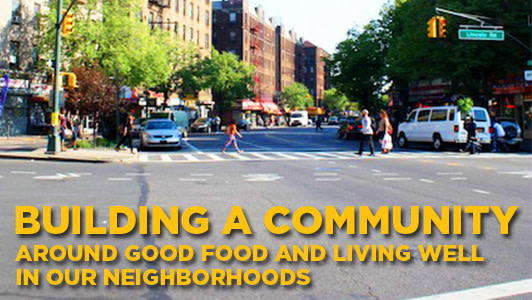
Our Story
The Lefferts Community Food Co-op started eight years ago as a buyer's club out of the house of a founding member. By 2014, the dream of a cooperative grocery store became a reality with our current home at 324 Empire Ave in the Lefferts Gardens Neighborhood. We are currently 120 members strong and eager to keep growing. (Read more about our early days here.)
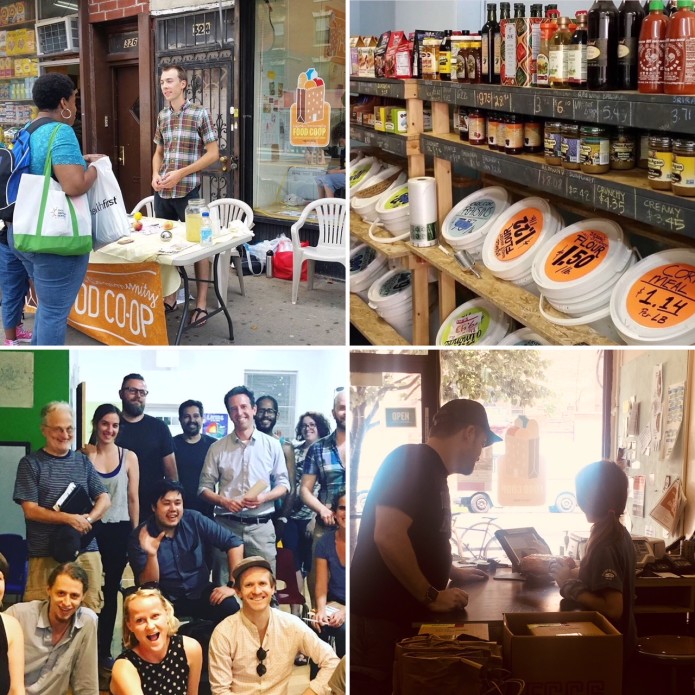
A designated Cooperative Corporation under NY State law, we are a member-owned and -operated food store open to all. Our mission is to sell sustainable, nutritious food at a good value, to encourage healthy food practices and to foster environmentally responsible activities through democratic cooperation. LCFC finds strength in the diversity of the community around us and commits to a selection of healthy foods and promotion of healthy eating that respects this.
Read more on our website: www.leffertsfoodcoop.org
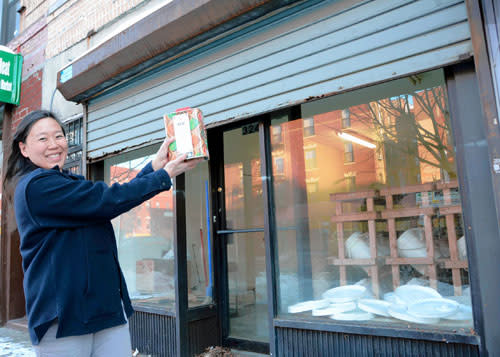
We are committed to our co-op! This urgent fiscal need has injected a surge of energy into our membership, who voted overwhelmingly to raise funds and keep the coop open. We've been busy learning, reorganizing, and strategizing for the future ... we've restructured committees, held weekly meetings, painted our gate, made improvements inside, revamped our newsletter, and started work on a backyard garden.
The past year we've also been working tirelessly on a loan from the Park Slope Food Coop. If we raise this $25,000, we will be sending a powerful message to their loan committee that we have an active and engaged membership and are in a position to pay the loan back.
By ensuring our financial stability and having the extra funds to grow, we feel confident that this resurgence will continue, and an even stronger co-op will emerge as a vibrant neighborhood hub.
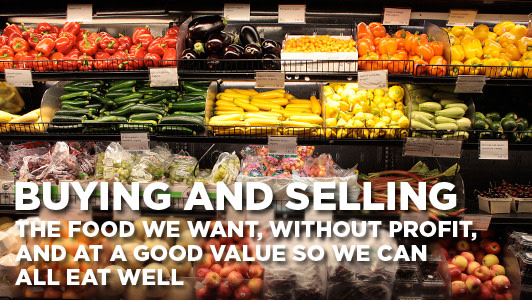
Other Ways You Can Help
PROMOTE our fundraiser to friends and family through social media, emails, and conversation. Indiegogo has some very easy ways to share our campaign directly to FB, Twitter, or direct emails to friends with pre-composed templates. Just click on those icons next to the “BACK IT” pink button on the campaign page.
COMMUNICATE our vision: supporters are the co-op’s greatest resource! Go out into the world and let people know why you choose to shop at the co-op.
OFFER A PERK: have a service or item you’d like to donate to our campaign? We’d love it! Click on "Ask A Question" at the top of the page and let us know what you can offer.
BECOME A MEMBER! Learn how here: www.leffertsfoodcoop.org/member.php
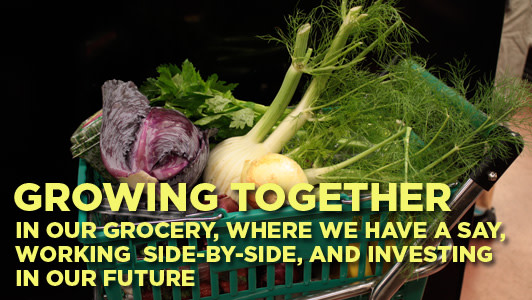
4 comments:
What would Warren Buffett say? Answer is below.
Help Us Survive & Thrive! You help is vital to our co-op's survival!But where...is this $25,000 going? $10,000 to shore up financials... $13,000 to double our inventory...and purchase new refrigeration. $2,000 for store improvements.
The store improvements and inventory expansion are essential to the co-op's long-term survival and will put us in a position of stability so we can continue to grow.
As stated in the LGFC profile:
How is this similar/different from Costco?
Costco is similar in that it offers the lowest cost it can to its members by buying in massive numbers.
However, Costco is owned by a large corporation, not by its members.
That's news. Costco is owned by its shareholders. Can "owners" of the co-op buy and sell their shares based on some market price?
In a food co-op, members of the community make the decisions for the best of the store and themselves and the corporation (the co-op) does not profit. If we make a profit, then we must lower our prices to our members.
So there you have it. Capitalism bad. Socialism good. Animal Farm alert.
Buffett would say the Food Co-op is bankrupt. However, if it were open more hours and if it raised prices, perhaps it would survive. But, the way things are going, it's time to raise a fist and strike a pose. Or just strike. Or resist. Whatever. Socialism or Die. Viva la Revolucion. Start selling the Che t-shirts.
In addition to low (and even very low) prices, as well as extremely fresh and mostly local produce, the spirit of community at a worker-member co-op is key. We are all together and equal, all working towards the same goals. Some of us do value things that can't be expressed in monetary terms. And not all of us worship at the temple of capitalism. Sorry, Anonymous 10:10.
And do you know what? You don't have to become a member or shop here. You can keep supporting corporate chains and overpaying for subpar quality. But for people who do care about the freshest produce, the lowest prices, and feeling a part of a community, check out your local food co-op.
Babs writes: Some of us do value things that can't be expressed in monetary terms. And not all of us worship at the temple of capitalism. Sorry, Anonymous 10:10.
Worship? Please. A little knowledge of economics and finance allows people to understand the success or failure of their favorite enterprise. The food co-op is failing. But, with the right management and the right changes, it would probably survive.
And do you know what? You don't have to become a member or shop here. You can keep supporting corporate chains and overpaying for subpar quality.
Obviously the consumers in the neighborhood are insufficiently moved to shop at the food co-op. If it were meeting their needs, the operators wouldn't have sent out an SOS for a benefactor willing to pay off the mounting debts.
Several years ago a similar situation arose at a coffee shop on Cortelyou Road near Coney Island Avenue. Vox Pop. A sort of anarchist hang-out started by a clown named Sander Hicks.
Bottom line, when Vox Pop went begging for money, a number of people from the community coughed up the cash. But then the money mysteriously disappeared and eventually the sheriff came along a padlocked the place.
There's no substitute for running a business on sound financial terms.
Sander Hick is/was a kook and a fraudster - nothing to do with the Food Co-op or its practices.
But I agree, the surrounding populace hasn't turned out in sufficient numbers to support the Food Co-op. The question is why. Lack of awareness of its existence is a good start - it's a smallish space and not terribly visible unless you know what you're looking for. And even if people notice it, they may not be sufficiently moved to investigate it further.
Outreach has always been a priority, but, as I can attest from my own experience with a variety of organizations and individuals, it's extremely difficult. The Food Co-op has done flyers, posted on social media, attended street fairs, and tried just about every way possible to engage with its neighbors. And yet you still hear people saying they never heard of it (this is also true of politicians running for office, organizations like PLGNA, and local shops and restaurants - I've volunteered on outreach for all of them at different times). It's extremely frustrating, and it seems to me that, unless a hand-engraved notice is delivered on a silver platter to some people they will ignore the event/organization/person/business.
Of course there is always a certain percentage of the population that can't/won't put up with the work requirement, but this is an excuse - there are many ways of fulfilling said requirement, not all of which demand on-site presence or fixed hours. Once people learn this, and see the effect of member-workers on prices, most are fine with it.
Another factor holding down membership numbers is the Co-op's extremely limited opening hours and inventory, and this is a Catch 22 - to open more hours and stock more items you need more members, but to get more members you need to have more opening hours and items.
So here is where the fund raising comes in - the Food Co-op could probably continue to limp along in its present state, serving limited items to a hard-core group of members, but it will never progress beyond that without a substantial cash infusion.
The Green Hill Food Co-op faced a similar situation when the building in which their store was located was sold and they had to find a new location. The raised funds via a crowdsourcing campaign (the LCFC campaign seems modeled on this) and have just moved into their new location, which is about to open.
But this shows the real underlying problem facing most businesses in NY - real estate. The Park Slope Food Co-op was able to purchase its buildings long ago, before real estate prices in NYC became exorbitant. For this reason alone they have been able to survive (and even prosper) relative to other area businesses. The PSFC in fact has so many members, who come from all over Brooklyn, that they are aggressively looking into establishing satellite locations and helping other existing co-ops via a loan program (Greene Hill has benefited from this, as well as from a member loan program; I do not know if the LCFC has.).
The PSFC has an outside idependent accounting firm which produces annual audited statements and provides financial advice; it also has outside investment managers - these are other crucial steps that should be among any organization's top priorities. Unfortunately, they cost money, and thus are likely to be disregarded.
If you do not own your space (this applies to residential housing as well) you can never be 100% secure in it, even if you have the world's best, most generous landlord, because eventually things will change - people die, or suffer financial difficulties that make them need to sell their property, etc. I question the long-term viability of any business that does not own its space, and those that do not should certainly be working towards that goal by establishing a separate and restricted fund specifically for an eventual purchase.
I wish the LCFC well in its fund-raising campaign and hope that it is able to use the proceeds to ensure its long-term financial stability.
Post a Comment